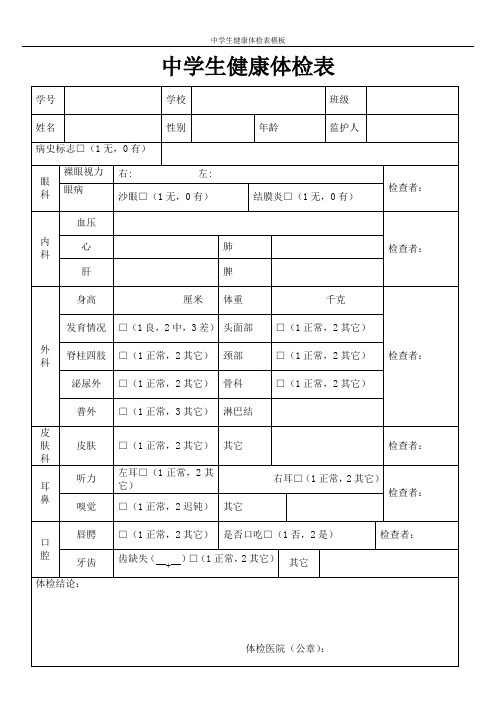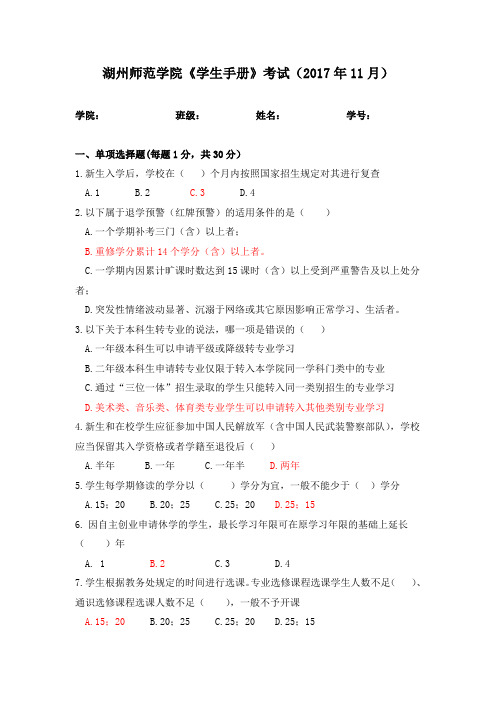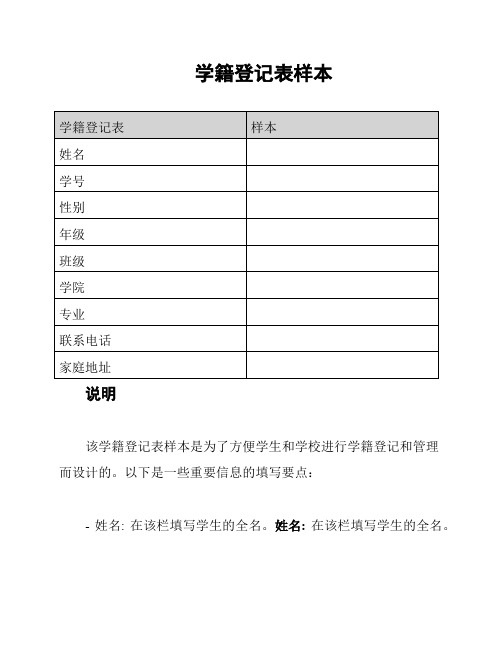学校_班级_姓名_学号
中学生健康体检表模板

学号
学校
班级
姓名
性别
年龄
监护人
病史标志□(1无,0有)
眼科
裸眼视力
右: 左:
检查者:
眼病
沙眼□(1无,0有)
结膜炎□(1无,0有)
内科
血压
检查者:
心
肺
肝
脾
外科
身高
厘米
体重
千克
检查者:
发育情况
□(1良,2中,3差)
头面部
□(1正常,2其它)
脊柱四肢
□(1正常,2其它)
颈部
□(1正常,2其它)
其它
体检结论:
体检医院(公章):
泌尿外
□(1正常,2其它)
(1正常,3其它)
淋巴结
皮肤科
皮肤
□(1正常,2其它)
其它
检查者:
耳鼻
听力
左耳□(1正常,2其它)
右耳□(1正常,2其它)
检查者:
嗅觉
□(1正常,2迟钝)
其它
口腔
唇腭
□(1正常,2其它)
是否口吃□(1否,2是)
检查者:
牙齿
齿缺失(+)□(1正常,2其它)
(完整)高中毕业生登记表(完整A4版)

省(市、自治区)高中毕业生登记表市(地、州)县(市、区)毕业学校班级姓名年月日填填表说明1.本表必须用钢笔或毛笔填写,字迹要清楚工整,不得任意涂改。
填写前,单位负责人应将本表各栏向本人介绍清楚。
2.本表所列项目要全部填写,不留空白。
如有情况不明无法填写时,应写明“不清”或“不详”,并注明原因。
如无该项情况应写“无”。
3.如有其它问题,本表项目未能包括,而本人认为需要说明时,可以另纸附上。
附件二:学年评语表姓名:学号:注:第三学年评语即毕业鉴定年附件三:考试(考查)成绩登记表姓名:学号:说明:1.考试成绩达到及格及其以上(含及格)和考查成绩合格者,填写开始(考查)成绩,考试(考查)成绩不及格或不合格者,带补考后填写补考成绩,并注明“补考”字样。
2.当年会考科(项)目,填写成绩等级,非会考科(项)目,填写学年总评成绩(百分制)。
3.必选课只记合格或不合格,任选课只记载选修与否,选修用“√”表示,未选修用“×”表示。
体格检查表省(自治区、直辖市)地(市、区)县学校届班学号体育合格情况登记卡山东省(自治区、直辖市)滨州地(市、区)县学校高中2003级班学号:姓名:性别民族出生日期:年月日校长(签章)学校(盖章)年月日身体素质测验登记表注:1、体育课栏内按照实际成绩填写分数;2.课间操、课外活动栏内填写“合格”、“不合格”;3.国家体育锻炼标准栏内左侧填写总分数,右侧填写“合格”、“不合格”;4.学年、学段总评栏内填写“合格”、“不合格”;5.参加区县、市、全国及国际体育运动竞赛获得成绩、名次,获得等级运动员称号,免修、降标原因等在备注栏内填写。
高中毕业生家庭情况调查表学校学生姓名学号附件七:社会实践活动登记表。
1-学生手册考试试题2017

湖州师范学院《学生手册》考试(2017年11月)学院:班级:姓名:学号:一、单项选择题(每题1分,共30分)1.新生入学后,学校在()个月内按照国家招生规定对其进行复查A.1B.2C.3D.42.以下属于退学预警(红牌预警)的适用条件的是()A.一个学期补考三门(含)以上者;B.重修学分累计14个学分(含)以上者。
C.一学期内因累计旷课时数达到15课时(含)以上受到严重警告及以上处分者;D.突发性情绪波动显著、沉溺于网络或其它原因影响正常学习、生活者。
3.以下关于本科生转专业的说法,哪一项是错误的()A.一年级本科生可以申请平级或降级转专业学习B.二年级本科生申请转专业仅限于转入本学院同一学科门类中的专业C.通过“三位一体”招生录取的学生只能转入同一类别招生的专业学习D.美术类、音乐类、体育类专业学生可以申请转入其他类别专业学习4.新生和在校学生应征参加中国人民解放军(含中国人民武装警察部队),学校应当保留其入学资格或者学籍至退役后()A.半年B.一年C.一年半D.两年5.学生每学期修读的学分以()学分为宜,一般不能少于()学分A.15;20B.20;25C.25;20D.25;156.因自主创业申请休学的学生,最长学习年限可在原学习年限的基础上延长()年A. 1B.2C.3D.47.学生根据教务处规定的时间进行选课。
专业选修课程选课学生人数不足()、通识选修课程选课人数不足(),一般不予开课A.15;20B.20;25C.25;20D.25;158.学生请假,应事先填写请假单,班主任签署意见。
请假在3天以上一周以内的由所在学院()审批,学院教学和学生管理部门备案A.辅导员B.主管教学的副院长C.学院副书记D.教务处9.根据考勤,一学期请假、缺课超过该学期总学时( )者,应予休学A.1/2B.1/3C.2/3D.3/510.学生未履行请假手续离校连续2周未参加学校规定的教学活动的,应予()A.警告B.记过C.开除学籍D.退学11.以下不属于纪律处分的是()A.警告B.记过C.开除学籍D.退学12.警告、严重警告处分的期限为()个月,记过、留校察看处分的期限为()个月A.6、6B.6、12C.12、12D.12、2413.违反国家法律、法令、法规,受到司法、公安部门处罚者,视不同情况给予处分。
学生证遗失声明

学生证遗失声明
一般来说,如果学生证遗失了,需要尽快向所在的学校申请补办。
同时,学生也需要及时声明该学生证已经遗失,以便防止非法使用造成的财产或人身安全风险。
以下是一个学生证遗失声明的范例:
声明人:[你的姓名]
声明日期:[当前日期]
声明事项:学生证丢失声明
因[说明学生证遗失的原因],本人现申明本人的学生证已经在[时间]遗失。
该学生证的相关信息如下:
- 姓名:[你的姓名]
- 学号:[你的学号]
- 班级:[你的班级]
- 学校名称:[你所在的学校名称]
本人声明,以上学生证所有信息均属实,如果发现有人使用本人的学生证,应由使用者自行承担所有责任和后果。
此致
敬礼!
声明人签名:_____________________
以上是一个学生证遗失声明的范例,具体内容可以根据实际情况进行适当调整和修改。
声明时应尽量提供详细、准确的信息,避免因遗失
的学生证造成不必要的麻烦和风险。
学籍登记表样本

学籍登记表样本说明该学籍登记表样本是为了方便学生和学校进行学籍登记和管理而设计的。
以下是一些重要信息的填写要点:- 姓名: 在该栏填写学生的全名。
姓名:在该栏填写学生的全名。
- 学号: 在该栏填写学生的学号,该学号是学生在学校中的唯一标识。
学号:在该栏填写学生的学号,该学号是学生在学校中的唯一标识。
- 性别: 在该栏填写学生的性别,可选择男、女或其他。
性别:在该栏填写学生的性别,可选择男、女或其他。
- 年级: 在该栏填写学生所在的年级,如一年级、二年级等。
年级:在该栏填写学生所在的年级,如一年级、二年级等。
- 班级: 在该栏填写学生所在的班级,如1班、2班等。
班级:在该栏填写学生所在的班级,如1班、2班等。
- 学院: 在该栏填写学生所属的学院或系,如文学院、工程学院等。
学院:在该栏填写学生所属的学院或系,如文学院、工程学院等。
- 专业: 在该栏填写学生所学的专业,如计算机科学、商务管理等。
专业:在该栏填写学生所学的专业,如计算机科学、商务管理等。
- 联系电话: 在该栏填写学生的常用联系电话。
联系电话:在该栏填写学生的常用联系电话。
- 家庭地址: 在该栏填写学生的家庭地址,便于学校与家长取得联系。
家庭地址:在该栏填写学生的家庭地址,便于学校与家长取得联系。
请确保填写的信息准确无误,并及时更新学籍登记表上的相关信息。
如有需要,可以向学校的学籍管理部门咨询或索取更多信息。
以上是学籍登记表样本的内容和填写要点。
希望能为您提供帮助。
如有任何问题,请随时联系学校相关部门。
谢谢!> 注:本文档仅为样本,具体学籍登记表的格式和要求可能因不同学校而异,请以所在学校的具体要求为准。
语文五年级2020-2021学年上学期期末质量检测(人教部编版,含答案)

2020-2021学年第一学期五年级语文期末检测卷学校:姓名:班级:学号:第一部分积累与运用一、看拼音,写词语。
(8分)xián qì dǎn qiè lǎn duò zhē bì()()()()qǐ dí jiàn zhù fáng ài róng shù()()()()二、选择题。
(写序号)(每题2分,共18分)1.下列加点字词的读音不完全正确的一项是()。
(2分)A.嗜.好(shì)烦琐.(suǒ)耽.误(dān)价格便宜..(pián yi)B.眸.子(móu)剔.透(tī)歧.途(qí)便宜..行事(biàn yí)C.强.逼(qiǎng)陶瓷.(chí)冤枉.(wàng)得力干将..(gàn jiàng)D.游隼.(sǔn)湖畔.(pàn)腼腆.(tiǎn)干将..发硎(gàn jiāng)2.下列词语书写无误的一项是( )。
(2分)A.吩付大臣迟延游泳B.编写硝毁传统陪伴C.规律派遣羞耻崩塌D.交外噪音乌鸦楷歌3.下列各组词语中加点字的意思完全相同的一项是()。
(2分)A.震耳欲.聋摇摇欲.坠含苞欲.放B.比.翼而飞将心比.心比.比皆是C.正襟危.坐居安思危.乘人之危.D.举.世闻名一举.两得举.一反三4.加点的字解释有误的一组是( )。
(2分)A.乃(你的)翁干将(得力将士)发硎国泰(像泰山一样看重)民安B.王孙(指诗人自己)自可留不拘(限制)一格兴高采烈(旺盛)C.几时休(停止) 流离(转徙离散)失所纵有(横竖都有)千古5.找出另外三组不同的一项是()。
(2分)A.夜不闭户路不拾遗B.足智多谋诡计多端C.呕心沥血处心积虑D.流芳百世遗臭万年6.下列句子中没有语病的一项是()。
初中学生证填写范本

初中学生证填写范本
初中学生证是中学生的身份证明和学习证明,填写正确和规范是非常重要的。
下面就为大家介绍一份初中学生证的填写范本,供大家参考。
一、学生基本信息
姓名:性别:
籍贯:学校:
班级:学号:
入学时间:年级:
二、学习成绩
学科学年成绩每学期成绩
语文
数学
英语
物理
化学
生物
历史
地理
政治
体育
综合实践
艺术
通讯技术
三、奖惩情况
奖项名称奖励时间奖励单位
年月日
年月日
年月日
年月日
处分名称处分时间处分单位
年月日
年月日
年月日
年月日
四、个人简介
自我介绍:
五、家长学生证的签字
学生:
家长签字:
日期:年月日
以上就是一份初中学生证的填写范本,每个项目的填写内容应
当准确规范,并且需要注意各种信息的排版和表格统计,使其更
具有美观性和可读性。
同时,在填写时也要注意个人隐私的保护,
防止泄露。
通过认真填写学生证,学生可以更好的证明自己的身份和学习情况,对于以后的学习和生活都是有帮助的。
学生基本信息表(空)

学生基本信息表家长确认签字:指标解释及填报说明(带★号项目必须填写!)1.姓名:在公安户籍管理部门正式登记注册、人事档案中正式记载的中文姓名(包括外国人正式的汉字姓名)。
2.性别:男、女。
3.出生日期:在公安户籍部门正式登记注册、人事档案中记载的时间日,年填4位数字、月填2位数字、日期填2位数字。
如:“2011-01-01”。
4.出生地:学生出生所在的行政区划。
(只填省市县)5.籍贯:祖居或本人出生的地方,现多用于父辈以上的居住地。
(省市县)6.民族:学生的民族,如:汉族、蒙古族等,不可填汉、蒙古。
7.国籍/地区:学生所属的国籍/地区,如:中国。
8.身份证类型:可证明学生身份的证件类型:1-居民身份证,2-户口簿,6-香港特区护照/身份证明,7-澳门特区护照/身份证明,8-台湾居民来往大陆通行证,9-境外永久居住证,A-护照,Z-其他。
无户口学生身份证件类型选Z-其他,身份证件号可不填,但学校需提供学生在本校就读证明(需学生和家长签字,学校盖章,提交上级教育主管部门备案)9.身份证件号:身份证件类型对应的证件号码。
10.港澳台侨外:在大陆上学,持非大陆身份证明的学生的来源类型,分为:‘00-否,01-香港同胞,02-香港同胞亲属,03-澳门同胞,04-澳门同胞亲属,05-台湾同胞,06-台湾同胞亲属,11-华侨,12-侨眷,13-归侨,14-归侨子女,21-归国留学人员,31-非华裔中国人,41-外籍华裔人,51-外国人,99-其他’。
11.政治面貌:小学生不填。
12.健康状况:学生的身体情况,分为:“10-健康或良好、20-一般或较弱、30-有慢性病、40-有生理缺陷、50-残疾”。
13.照片:学校统一导入学生的照片。
14.姓名拼音:不填写15.曾用名:曾正式使用过的姓名。
没有则不填。
16.身份证件有效期:身份证件上显示的有效期限。
户口簿可不填。
17.户口所在地:公安户籍部门确认的学生户口所在行政区划(户口首页,只填省市县)18.户口性质:公安户籍部门确认的学生户口的类别,分为“1-农业户口,2-非农业户口”。
- 1、下载文档前请自行甄别文档内容的完整性,平台不提供额外的编辑、内容补充、找答案等附加服务。
- 2、"仅部分预览"的文档,不可在线预览部分如存在完整性等问题,可反馈申请退款(可完整预览的文档不适用该条件!)。
- 3、如文档侵犯您的权益,请联系客服反馈,我们会尽快为您处理(人工客服工作时间:9:00-18:30)。
2007—2008学年度第一学期六年级语文期中检测
成绩
一、词句训练
1、看拼音写词语10%
j ìng m î di ān b ǒ b ā l í shu ǎ l ài hu āng w ú r ãn y ān ( ) ( ) ( ) ( ) ( ) qu án h ãng k ān ch ēng shu î gu ǒ r ïng qi à ch ū r ãn t ïu d ì ( ) ( ) ( ) ( ) ( ) 2、用“ ”划出加点字的正确读音。
4% 蓦.
然(m ù m î)薄雾(b áo b ï)逊色(x ūn x ùn )战车千乘(ch ãng sh âng ) · · · ·
秩序(zh ì ch ì)撇下(pi ē pi ě)刁难(n àn n án )枉费心机 (w ǎng w àng ) · · · ·
3、用“ ”找出词语中的错别字,并把正确的字写在括号里。
3%
锣鼓宣天( ) 悲愤欲决( ) 负偶顽抗( ) 惊心动魂( ) 爱不饰手( ) 银妆素裹( ) 4、把下面的句子写具体。
6%
⑴他的肚量真大, 。
⑵今夜可真黑, 。
⑶校园里静得出奇, 。
5、根据读音或意思造句。
4% ⑴di d ào
地 道 di dao
地 道 ⑵漂亮(好看的意思)
漂亮(指出色)
5、用修改符号修改下面一段话。
6%
有一个劳改犯人外出修路时,检到了1000元钱,他不假思索地把它交给了监管警察。
于是,监管警察却轻蔑的对他说,你别来这一套,拿自己的钱变着花样贿赂我,想换来减行,你们这号人就是不老实! 6、成语运用。
3%
用几句话夸夸中国的剪纸艺术或中国的戏剧,至少用上三个成语,所用成语要用横线标出。
……………………………………………………………………………………………装……………………………装………………………………
……………… 学校校____________ ____________ _ 班级班级____________ ____________
二、积累与运用20%
1、通过这两个多月的学习,我认识了许多人物:的夏洛蒂,的霍金,鲁滨逊,的哈尔威,的廉颇,的……他们都是我学习的榜样。
我游览了许多风景名胜:的黄山,的西湖……我还学会了一些俗语呢,不信,我说给您听听:
;。
2、中国古代的爱国诗人真不少,、、陆游等。
代陆游的《示儿》还在我耳边回响:,。
,。
我还会背陆游的另一首爱国诗呢《》,。
,。
3、我知道《将相和》的三个故事:《》、《》、《》,我最欣赏故事中的,因为他。
4、后生们的胳膊、腿、全身,搏击着,搏击着,搏击着。
它着你,着你,着你。
它使你从来没有如此鲜明地感受到、。
它使你惊异于那的躯体,那,居然可以释放出
!这段话主要讲安塞腰鼓好在哪里?
三、阅读理解14%
一个在日本打工的中国留学生,同其他留学生一样,在课余为日本餐馆洗盘子以赚取学费。
日本的餐饮业有一个不成文的行规,(既即)餐馆的盘子(必须必需)用水洗上七遍。
由于洗盘子的工作是按件计酬的,这位留学生一天累下来,也得不了多少工钱。
于是他计上心头,以后洗盘子时便少洗两遍。
果然,劳动效率
便大大(增加提高),他也因此受到老板的器重,工钱自然也迅速增加。
一起洗盘子赚学费的日本学生便向他请教技巧。
他毫不隐讳huì,说:“你看,洗了七遍的盘子和洗了五遍的有什么区别吗?少洗两次嘛。
”日本学生诺诺,却与他渐渐疏远了。
日本人看人,有两个预先约定:一个,你是无罪的;另一方面,你是诚实的。
所以,餐馆老板只是偶尔抽查一下盘子清洗的情况。
一次抽查中,老板用专用的试纸测出盘子清洗程度不够并责问我们这位留学生时他振振有辞洗五遍和洗七遍不是一样保持了盘子的清洁吗老板只是淡淡地说你是一个不诚实的人请你离开这位留学生走到大街上愤愤不平举起拳头对着日本餐馆高呼打倒日本帝国主义
口号归口号,为了生计,他又到该社区的另一家餐馆应聘洗盘子。
这位老板打量了他半天,才说:“你就是那位只洗五遍盘子的中国留学生吧。
对不起,我们不需要!”第二家、第三家……他屡屡碰壁。
不仅如此,他的房东不久也要求他退房,原因是他的“名声”对其他住户(多是留学生)的工作产生了不良影响。
他就读学校的领导也专门找他谈话,希望他能转到其他学校去,因为他影响了学校的生源……万般无奈,他只好收拾行李搬到了另一座城市,一切重新开始。
他痛心疾首地告诫准备到日本留学的中国学生:“在日本洗盘子,一定要洗七遍!”
1、给短文加个题目:2%
2、联系上下文,写出下面词语的意思。
2%
⑴毫不隐讳:
⑵屡屡碰壁:
3、给文中空白处加上标点符号。
3%
4、用“√”选出第一自然段中正确的字词。
3%
5、这位中国留学生告诉日本学生洗盘子的技巧后,那位日本学生为什么却与他渐渐疏远了?2%
6、这位中国留学生搬到另一座城市后,会怎么工作呢?2%
四、习作30%
读了上面这则故事后,你一定有很多感受,请围绕自己的亲身经历,以“诚信”。
